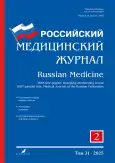Evaluation of social determinants of health, health status, and well-being among medical students
- 作者: Popov M.V.1
-
隶属关系:
- Voronezh State Medical University
- 期: 卷 31, 编号 2 (2025)
- 页面: 151-158
- 栏目: Original Research Articles
- URL: https://journal-vniispk.ru/0869-2106/article/view/313387
- DOI: https://doi.org/10.17816/medjrf643369
- ID: 313387
如何引用文章
详细
BACKGROUND: A healthy young generation is the foundation of Russia’s future. Evaluation of students’ health status, social determinants health, and well-being indicators is a relevant task.
AIM: To assess social determinants of health, health status, and well-being in medical university students.
METHODS: A survey was conducted among second-year (n = 197) and fifth-year (n = 125) students of the General Medicine Department at Voronezh State Medical University. The questionnaire consisted of four sections evaluating: study load and rest balance (11 questions), health status (15 questions), living and nutrition conditions (9 questions), determinants of health and well-being (10 questions). Additionally, a section on personal information was included. Responses were scored from 1 to 3, and a total score was calculated for each section. Students were categorized into low-, medium-, and high-risk subgroups based on their scores.
Statistical significance of differences in mean total scores was evaluated using Student’s t-test.
RESULTS: The overall assessment of social determinants of health, health status, and well-being indicated that none of the analyzed student groups (male and female, second- and fifth-year students) were categorized as high-risk based on questionnaire sections.
Statistically significant differences in group averages were identified only among female students for study load-rest balance (section 1) and health status (section 2).
Second-year female students had a statistically higher risk in certain sections compared to fifth-year students: in section 1, the mean total score was 23.6 ± 0.2 points for second-year students and 21.9 ± 0.3 points for fifth-year students, indicating a significantly higher study load burden among second-year students (t = 4.53 > tcrit = 1.98; p = 0.95); in section 2, the mean total score was 23.4 ± 0.4 points for second-year students and 21.8 ± 0.4 points for fifth-year students, demonstrating a statistically significant difference in self-reported health status, with second-year students being at a higher risk (t = 2.91 > tcrit = 1.98; p = 0.95).
CONCLUSION: The findings highlight the need for collaborative preventive programs between medical and educational institutions. These programs should focus on raising awareness about health-preserving behaviors, particularly among junior-year students.
作者简介
Maksim Popov
Voronezh State Medical University
编辑信件的主要联系方式.
Email: sportandorthodox@mail.ru
ORCID iD: 0000-0002-1480-4013
SPIN 代码: 4302-5811
俄罗斯联邦, Voronezh
参考
- Ivanova TI, Vasilchenko KF, Blokh AI. The role of personal factors in the development of alcohol cunsumption harmfull for health in students. Transbaikalian Medical Bulletin. 2020;(4):49–57. doi: 10.52485/19986173_2020_4_49 EDN: SCWWHJ
- Indutnyy AV, Novikov DG, Samuseva NL, Tagakov KS. Questionnaire and biomarker-based risk assessment of alcohol abuse among persons receiving various levels of medical professional education. Kazan Medical Journal. 2019;100(6):910–917. doi: 10.17816/KMJ2019-910 EDN: VLMXTT
- Kakabeliev RA, Mazlov AM. Assessment of smoking prevalence among first-year students of Astrakhan State Medical University. Evrazijskoe nauchnoe ob#edinenie. 2020:(4-3):160–162. (In Russ.) EDN: IHGILR
- Veselova ES, Baltachev AA, Tolmachjov DA. Study of smoking prevalence among 4th year students of the Medical Faculty of Izhevsk State Medical Academy. Modern Science. 2020;(11-30):249–252. (In Russ.) EDN: WGXSEA
- Shubochkina EI, Guryanova MP, Kurgansky AM, et al. Health risks for adolescents and young adults posed by electronic cigarettes. Public Health and Life Environment — Ph&Le. 2024;32(6):54–63. doi: 10.35627/2219-5238/2024-32-6-54-63 EDN: YRYNOJ
- Sycheva AV, Tkacheva EG. Impact of modern smartphones on student youth health. Nauka-2020. 2021;(1):6–9. EDN: KIABLD
- Vasilev A. The dependence of youth health on cell phones. Studencheskij. 2022;(22-5):54–55. EDN: QKXNTQ
- Sozonova AN, Klanyuk TS, Lastovlyak VA, Sys TS. Impact of a sedient lifestyle on health of modern youth. Uchenye zapiski universiteta imeni P.F. Lesgafta. 2023;(10):414–418. doi: 10.34835/issn.2308-1961.2023.10.p414-418 EDN: PHBLZM
- Zinurova RI, Tuzikov AR. Social health of youth: quality of life and national security. Managing Sustainable Development. 2023;(1):39–46. doi: 10.55421/2499992X_2023_1_39 EDN: VEKWBK
- Kratinova IP, Kurakh YuA. The problem of monitoring and saving the health of student youth. Vestnik of the Lugansk Vladimir Dahl National University. 2020;(6):54–58. EDN: NUJOHK
- Bulyha VV, Shebeko LL. Automated assessment of the physical condition and health of students. Bulletin of Polessky State University. Series in Social Sciences and Humanities. 2022;(1):82–92. EDN: TOPQYA
- Brazhnik EI, Guseva MS. Primary social prevention of addictive behavior of youth as an integrated healthcare activity. Social'naja rabota: sovremennye problemy i tehnologii. 2020;(2):47–57. EDN: UDEEDG
- Kuznetsova OYu, Dikopolskaya NB, Bilalova GA, et al. Health promotion among young people. Russian Journal of Preventive Medicine and Public Health. 2023;26(1):85–88. doi: 10.17116/profmed20232601185 EDN: WSCLAK
- Kemalova LI, Nasibullaev ID. Health-saving technologies as a way to maintain mental health of student youth. Therapist. 2024;(8):22–30. doi: 10.33920/MED-12-2408-02 EDN: ZEOYMX
- Otdel'nova KA. Determination of the necessary number of observations in socio-hygienic studies. Proceedings of the 2nd MMI. 1980;150(6):18–22.
- Narkevich A, Vinogradov K. Methods for determining the minimum required sample size in medical research. Social Aspects of Population Health. 2019;65(6):10. doi: 10.21045/2071-5021-2019-65-6-10 EDN: MRAPST
- Ushakov AA. Use of the centile method of statistics in the practice of scientific research. Uspehi sovremennogo estestvoznanija. 2008;(5):150–151. (In Russ.) EDN: IQFSAR
- Zhuravlev VA, Lisunova AS, Kizilova AA, Mironova SV. Attitudes of future doctors towards their health. Scientist (Russia). 2024;(1):23–33. (In Russ.) EDN: VCIKPE
- Yaroshevich IN. Features of healthy lifestyle education first-year students. Sovremennye tehnologii i nauchno-tehnicheskij progress. 2023;(10):364–365. doi: 10.36629/2686-9896-2023-1-364-367 EDN: GBVDDH
- Dorofeev AL, Pavlova SP, Chibisov YuV. Health of medical university students according to medical examination data. Vestnik obshhestvennogo zdorov'ja i zdravoohranenija Dal'nego Vostoka Rossii. 2023;(3):57–63. EDN: ILTMSD
补充文件






